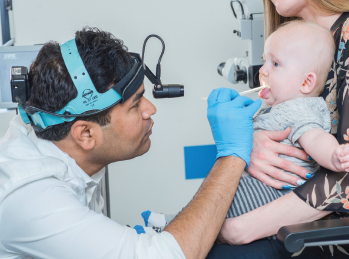The American Board of Otolaryngology-Head and Neck Surgery (ABOHNS) wants to provide an update about the progress toward subcertification in complex pediatric otolaryngology (CPO). This subspecialty is defined as the compendium of medical knowledge and care for:
Explore This Issue
August 2020- Children with complex otolaryngologic disorders, and/or
- Common otolaryngologic disorders in otherwise complex children.
A key tenet of CPO is that these children are, on many occasions, better suited for medical or surgical care in tertiary pediatric facilities within interdisciplinary teams. Subcertification in CPO isn’t intended to include the evaluation and management of all children with otolaryngologic disease, because the majority of pediatric patients can be treated by ABOHNS diplomates with primary certification in otolaryngology-head and neck surgery.
The effort to create the CPO subcertification started in the 1990s with its approval as a subcertification by the American Board of Medical Specialties (ABMS), followed by accreditation of fellowship training programs in pediatric otolaryngology by the Accreditation Council for Graduate Medical Education (ACGME). The number of accredited fellowship programs increased from four in 2001 to 30 in 2019, with more than 40 fellowship positions now available each year.
In January 2018, the ABOHNS formed the CPO steering committee as an advisory committee to the ABOHNS board of directors. The steering committee is composed of directors from the ABOHNS and leaders from the American Society of Pediatric Otolaryngology (ASPO). The ABOHNS directors include Kathleen C Y Sie, MD; Ronald B. Kuppersmith, MD, MBA; Jeffrey M. Bumpous, MD; and Marlan Hansen, MD. ASPO leaders include Kenny Chan, MD; Stacey L. Ishman, MD, MPH; and Diego Preciado, MD, PhD.
ABOHNS Subcertification Efforts

© LTH NHS TRUST / Science Source
The CPO steering committee has been working diligently over the past two years. Activities have included the following:
Establishing a process and eligibility requirements
The committee reaffirmed that the CPO subcertification process will include a written qualifying examination (WQE) and an oral certifying examination (OCE).
Eligibility criteria have been defined for the subcertification, which will include practice setting, case types, and participation in multidisciplinary activities. Once available, a document describing qualifying cases will be posted on the ABOHNS website. The training pathway will require completion of an ACGME-accredited fellowship and satisfaction of the eligibility criteria. The practice pathway does not specify a training requirement; candidates will be required to meet the eligibility criteria to take the examination. The practice pathway is anticipated to be open for seven years. (See “CPO Subcertification Eligibility Criteria” below.)